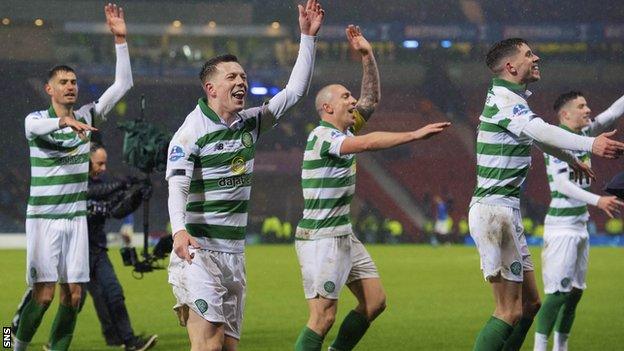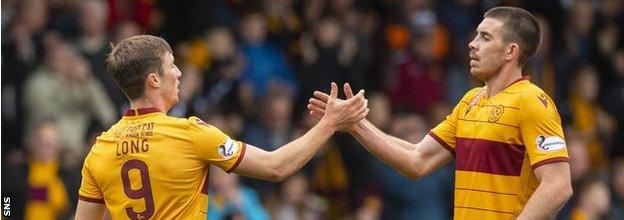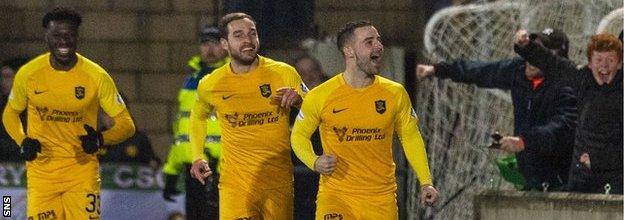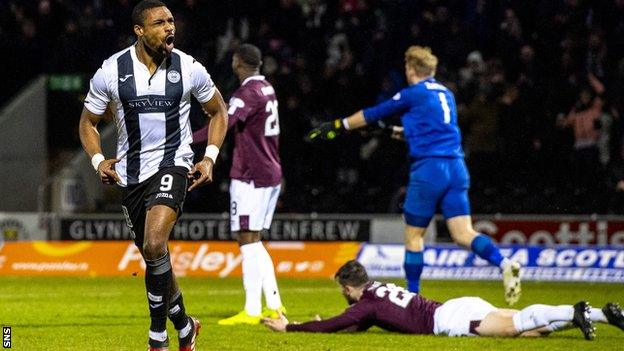Scottish Premiership season review: From Celtic in overdrive to Hearts' epic failure
- Published

Celtic surged clear in 2020 to secure their 11th consecutive domestic trophy with a ninth title in a row
At some point in the very near future Celtic will lift the Premiership trophy again, their ninth in a row, while Rangers will raise an asterisk, the only thing that passes for a consolation prize at Ibrox after an expensive and fruitless attempt to stop the silver heading to the east end of Glasgow.
At the other end, the trapdoor has now officially opened and Hearts have plunged through it. Their fall was unjust, an affront to fairness given that so many games were left to play. But if the SPFL's hugely controversial resolution was the thing that pushed them over the edge it was their own wretched decision-making that brought them to the edge in the first place.
Hearts won four league games this season and only six in the last 12 months. You could cover their pitch with £500 notes and still need more grass to symbolise their wastefulness. Millions were spent on duds and now more millions will be lost because of their ejection from the Premiership. Their failure has been an epic one.
Brown still Celtic's ace in pack
In this review of the top flight we start with the champions, 13 points clear when football was suspended with Rangers having one game in hand.
Celtic had two blips in the campaign. They lost to Livingston in early October and then won 11 in a row after it. They lost to Rangers in late December and won eight on the bounce. That loss at home to Steven Gerrard's team suggested that their biggest challenge in nine years was about to be laid down. They not only met it head-on, they nutted it out of sight.
There'll always be talk of the Rangers implosion after the winter break, and it's unavoidable, but Celtic's form went into overdrive when they needed it most. They dropped two points in the 10 games after Rangers won at Celtic Park. They scored 34 goals in those games, putting three on Kilmarnock (twice), Ross County and St Johnstone, four on Hamilton and Motherwell and five on St Mirren and Hearts.
Their big players, performing with the hunger of men who'd never won a thing in their lives, delivered under pressure. Odsonne Edouard scored nine times in those last 10 games, Leigh Griffiths found himself again and netted seven, Callum McGregor scored six. With eight games left to play they had already scored more league goals than they did all last season and all the season before.
It was a powerhouse few months, all of it orchestrated by Neil Lennon, who has made Brendan Rodgers a distant memory, and Scott Brown, who couldn't be described as Celtic's most talented player but could absolutely be described as their most important.
His leadership, his relentless driving of standards, is one of the things that separated Celtic from Rangers. They still don't have a Brown. They don't have an Edouard or a McGregor either but of all the cards that Celtic hold over Rangers, Brown remains the ace. His influence is everywhere, off the pitch and on.
This title might not have been won the way Celtic would would have wanted, but they are clearly the best team in the country. No sane voice can argue against it. Rangers have much to learn. They've thrown a lot of money at their manager but the way they folded after the winter break told of a weakness in their make-up.
Alfredo Morelos is a 10-part Netflix series unto himself. When his team needed him most on that run-in, he collapsed. In his last nine games he didn't score once. That's 12 hours without a goal for a proven goalscorer. That's not an issue of talent, it's an issue of mentality.
Gerrard has signed too many players who are not made of the right stuff. They won five of their last 10 games. They lost against Hearts, Kilmarnock and Hamilton, drew with Aberdeen and St Johnstone, and and got over the line by a single goal against St Mirren, Hibernian, Livingston and Ross County.
Some may say that they blew it. They didn't. They just weren't good enough. Whenever games resume, and Celtic's quest for 10 begins, the pressure on Gerrard will be extraordinary. A 13-point deficit - albeit with a game in hand - was not how it was supposed to be.
Robinson's stock rises as Aberdeen stutter

Chris Long and Declan Gallagher proved to be sound signings for Motherwell
Last season, Motherwell finished eighth, lost their three top scorers, sold one of their top young players - and then finished third. Stephen Robinson's recruitment hit the mark big time when he signed Declan Gallagher from Livingston and Chris Long from Blackpool. Both had significant seasons.
Robinson did a good job amid testing professional and personal circumstances, albeit the end of the season may have come as a bit of a blessing for them given that they won only one of their last eight league games before the shutdown. Motherwell could do with holding on to their manager. Northern Ireland might come calling at some point.
Aberdeen were a point behind in fourth in what was an odd season. They won three games in a row in the autumn, the only time they ever threatened to go on a run. They didn't even win two in a row before that spell - or after. Derek McInnes came under heavy fire from the fans after a 5-0 loss to Rangers and an insipid 4-0 defeat by Celtic, made worse by the fact that it was at Pittodrie and also because it could have been 8-0.
Off the field, they made strides with the opening of their new training base and an injection of money, but they have a lot of work to do for next season. Aberdeen became overly reliant on Sam Cosgrove's goals. He got 23 in all competitions, a great haul, but he fell away in the new year, scoring just once in the league, from the penalty spot.
Cosgrove ended up on the bench as Aberdeen tried to find some momentum. Of the top six, the Pittodrie side scored the fewest goals, which is a reflection of their overly defensive tactics at times and an illustration that McInnes could do with more firepower. This league season was something of a non-event for Aberdeen.
Holt's high achievers
Fifth place was an outstanding result for Gary Holt's Livingston, especially since the foundations of their side were uprooted in the summer with the loss of their goalkeeper, Liam Kelly, and two of the major performers in front of him, Craig Halkett, who's now pondering life at relegated Hearts, and Gallagher, who is now a Scotland player. Halkett was also Livi's joint top scorer last season.
Lyndon Dykes stepped into the breach with nine league goals. Steven Lawless got eight. Their home pitch undoubtedly helped them - they won eight, drew four and lost only two - but Holt was astute in his signings and his team retained the doggedness of before, even if they were struggling at the time play was suspended.
They beat Celtic 2-0 in their highlight of the season and were seconds away from defeating them a second time only for Tom Rogic to score a 90th-minute equaliser. Not many would have predicted a top-five finish for Livi, maybe not even Livi fans.

Livingston had the best home record outwith the Old Firm in the Premiership
St Johnstone didn't win any of their first nine league matches and were joint bottom in early December, but Tommy Wright did what Tommy Wright does and got them the hell out of danger. In the end they were only a point behind Hibernian and they had a game in hand, too. And when the league was called, the Perth club sneaked into the top six in place of the Easter Road side thanks to a better points-per-game average.
Jason Kerr, Jamie McCart, Ali McCann and Callum Hendry are four young players that the new St Johnstone manager will inherit. All of them did their stuff in those last few months when the heat was on. How do you replace the redoubtable Wright? With immense difficulty. They've lost their greatest ever manager and there are no certainties in life after him.
It seems like an age since Paul Heckingbottom was manager of Hibs, but his unhappy reign only ended in November. Jack Ross came in and steadied a wobbly ship. Ross did nothing remarkable, but he got them to sixth - which became seventh when the league was called - in what was an eminently forgettable season. It's still a whole lot better than the feeble fate that befell their city rivals. Hearts' plight was by far and away the highlight for Hibs fans.
Christian Doidge came good and finished with 12 league goals, the first Hibs striker to hit double figures in the Premiership since Griffiths. Hibs were too timid and too easy to score against all season, conceding 49 times, the highest number of any of the top nine clubs. They're missing some steel and some resilience, but unlike their dear friends across the city, they got themselves through a tough patch and they'll be glad of that small mercy.
Kilmarnock know what it's like to lose their leader. Last season they finished third under Steve Clarke, this term it was eighth under Angelo Alessio and then Alex Dyer. The Ayrshire side didn't just lose a fantastic manager, they lost some players who contributed handsomely to their wonderful campaign in 2018-19.
Greg Taylor, Jordan Jones and Greg Stewart all made contributions in Clarke's last season. The club fell away, as was expected. They were easier to score against and easier to beat. Last season they only conceded 31 league goals but they'd already conceded 41 before games were halted this time around.
In Kilmarnock's struggles, there's a cautionary tale for St Johnstone. Having an iconic manager is brilliant while it lasts, but when he goes he's often an impossible act to follow.
St Mirren's last-gasp rescue & Hearts calamity
St Mirren's last game was at home to Hearts, the night that punters were told that if they were found coughing at the turnstiles they wouldn't be let in. The game should never have gone ahead, but it did and St Mirren won it and that's what kept them safe.
Had they lost 1-0 instead of winning 1-0 they would have gone to the bottom of the league. Right now, they'd be a relegated team, not on points gained or goal difference but on goals scored. Imagine that.
Vaclav Hladky again showed his class as one of the Premiership's finest goalkeepers. Jim Goodwin brought in Ilkay Durmus and Jonathan Obika and both performed. Durmus scored four league goals - three winners and one equaliser. Obika has become a cult hero and it was he who got that critical goal against Hearts. The big fella is immortal in Paisley now.
Ross County, in 10th, conceded 60 goals and will breathe a sigh of relief because they were in freefall, winning only two of their last 13 games. Hamilton Academical were two points behind in 11th but had at least had found form, beating Rangers and Kilmarnock in their final two games. Hamilton looked well capable of saving themselves, Ross County less so.
So they'll praise the Lord for dismal Hearts, the most expensive basket case since Elton John ordered a hamper of champagne and roses. It would be hard to catalogue all the failings throughout the season without crashing this website, but from Craig Levein to Austin MacPhee to Jon Daly, from Donis Avdijaj to Loic Damour, from Marcel Langer to Glenn Whelan and onwards to the appointment of Daniel Stendel, it's been one huge misstep after another. Everything has turned to dust for the one-time queen of Hearts, Ann Budge.
In a football country that long since cornered the market in bonkerdom, this season excelled itself in the weirdness department. It was short. Sweet and sour and then some.

Jon Obika's winner for St Mirren against Hearts in March proved decisive in the relegation reckoning
